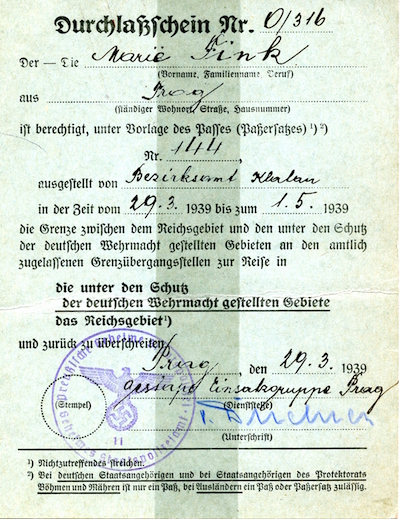
Marie "Mizzi" Fink – Born Marie Siller in 1909 in Eisenstein, Germany
- Moved to Prague, Czechoslovakia at age 14, would visit sister studying in Karlsbad where she met Karl Fink, married in 1936
- Nazis invaded Sudetenland (which included Eisenstein and Karlsbad) in 1938, then Prague in 1939 where Mizzi and Karl were
- Karl waited in line for days to get exit visas, which allowed them to escape in 1939 to Holland and on to England the last day they could enter the UK without entrance visas
- Immigrated to America in 1942
When the Nazis invaded Czechoslovakia in 1939, Karl Fink waited in line for days to obtain exit visas for himself and his wife, Mizzi. Upon receiving them on March 29th, 1939, the young couple fled that day for England. Though unknown at the time, the Finks arrived in the United Kingdom on the last day immigrants were allowed to enter without an entrance visa, April 1st, 1939.
From Mizzi's story:
March 15, l939 was the fateful day! In the early hours in the morning, the Radio Prague announced that Adolf Hitler was at the Czech borders and was marching towards Prague. This was the worst news we could imagine. We were so naive and dumb; we did not think this would ever happen! It was a terrible blow. People were screaming and crying. It was the saddest day imaginable. A few hours later, the tanks were rolling. The Germans were marching down Václaskě Náměsty–Prague's main square. It was a dark day. Streetlights were on - people were marching and crying - an unforgettable day. I too watched there.
There was no time to lose. We knew that we had better leave because conditions to leave would get more and more difficult. The Nazis required you to have documents to leave one's country, which were most difficult to get, and without them, one could not leave. So everybody (the Jews, who wanted to get out of the country) naturally tried to obtain these documents and waited in line for hours, days; so did Karl. We decided that we would leave at once as soon as Karl obtained the two cards (permission) to leave from the Gestapo. I knew that I had better be packed and ready to say good-bye to my parents and friends...the hardest thing to do. We packed and all. We also found out that passengers to England still did not require a visa until April 1st. The train would go through Nazi Germany. What a decision to leave one's country, family and friends---everything!
This was the great chance! Oh please let's not miss it. "Please Gestapo; give us the #Nr01315 and #Nr01306 DURCHLASS-SCHEIN." (These were the train numbers and lines) Karl and I were so lucky! We obtained these blue cards issued on March 29th 1939! We were able to leave the same day and hopefully, save our lives. Unfortunately, friends, who fled to the woods to escape, got shot and killed. Only a few people could leave–not my parents, relatives, etc. We parted at the railway station crying; knowing we might not see each other anymore.
We went with the next train to England on March 30th. Visas were still not required until April 1st 1939. Each of us was allowed one suitcase plus RM 10.00 (Equivalent of $5 to $10 today). Many people could not decide whether to leave and wanted to come later. Had my parents gotten on the train instead of waiting in Prague, they could have saved their lives. I could never get over it. I was never able to get over it. I will never forget it! It was the Masaryk Railway Station. We discovered that this train was full of Jewish refugees like us. So again, I had to part with my parents' relatives and friends who came to this train. It was terribly emotional!
After a while riding on the train, two Gestapo officers entered and demanded our passports. When Karl handed them both to them, one of the officers looked quite a while at mine, and then he looked at me and screamed, "ich hätte gute lust sie zu-rück zu schicken (I would like to send you back!)." I started to cry. We pleaded with him. It was terrible. Finally, after some anxious moments with him, he threw the passport back at me. All of us, including the other passengers in the compartment were relieved. The train went through Nazi Germany. It stopped several times at gasoline stations. Sometimes, we all had to leave the train with our suitcases for inspections. Everybody had to carry his or her suitcase to be examined. Some passengers were stripped naked, suspected for smuggling something. Luckily, we did not have to undress and they left us alone.
Additional Resources
German Jewish Refugees 1933-1939 (USHMM)
Add event to calendar
